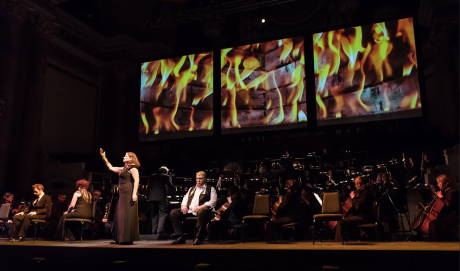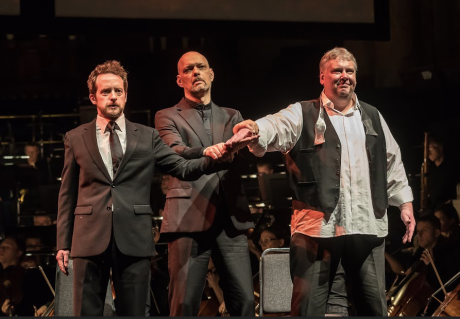3 p.m. starts don’t agree with me at all: and on this showing I wouldn’t say they much agree with the Opera North orchestra’s principal horn either, who, offstage in the Act I Rhine Journey and the Act III foregathering of the hunt had pretty much the same catastrophes as befell him in Siegfried Act II on Thursday. Once I can forgive; twice, I get less forgiving; three times, and I think something needs doing (as it does with the ROH’s delinquent trumpets, big time and soonest). Still, these aberrations apart – and the largely inevitable assortment of sporadic wrong entries, split wind/brass chording and the odd lapse-of-ensemble scramble duly noted and allowed for – I have to say that the band’s performance, throughout in general, and today in particular, strikes me as the single finest “star-turn” of the whole cycle, with some quite ravishing string playing – silky violins, soulful cellos and gorgeous, gorgeous violas – and fabulously characterful winds, with an oily bass clarinet and a truly fat and nutty-sounding cor anglais. Excellent trumpets and trombones, too, not to mention the three offstage steerhorns which accompany Hagen’s summoning of the vassals in Act II, here brought onstage and turning out not to be steerhorns at all, but bizarre-looking, narrow-bell wooden, slide-less trombones which make the most stupendously coarse racket (and which turn out to be, I discover to my amusement, on loan from the Royal Opera House, where of course they haven’t been seen – as opposed to heard – before). Barenboim’s Berlin Staatskapelle forces caused conniptions at the Albert Hall in 2013 – I know: I was there, and reviewed it here – but I would say that the Opera North’s house band’s playing was markedly superior, and certainly (for the most part) more accurate in the all-important brass.

And there was a vocal triumph to be witnessed in the shape of Kelly Cae Hogan’s Brünnhilde, not perhaps as secure in the mid-range singing as Nina Stemme was in the role, but similarly fearless, tireless and full-bodied in alt (and, dare I say it, with a somewhat warmer, clearer, less matronly tone in general). I thought her contribution tonight – and indeed throughout – nigh-on exemplary, and it would be nice to think that the hard-of-hearing casting crew at Covent Garden might one day wake up and take notice, since she is several leagues ahead of any of the exponents of the role who’ve sung in their woefully cluttered and confusing Warner/Lazaridis staging – which I note with dejection is to be trotted out again, O God – since Lisa Gasteen appeared in the original outings back in 2005. Both the cruelly written trio that ends Act II and the Immolation scene found Ms. Hogan in superb voice, and I really have to reach back in my memory (and diaries) to Birgit Nilsson and Rita Hunter, the first two Brünnhildes I ever heard, for an equivalent sense of effortless radiance.

I also greatly liked Andrew Foster-Williams’ powerfully sung Gunther (somewhat at odds with the mincing neurotic he was obliged to act) and the Gutrune of Giselle Allen, whose voice gets fuller and freer the higher it goes. Jo Pohlheim returned as Alberich for his brief Act II morale-booster to his comatose son (cue one of the only decent bits of stage business to be found in this whole sorry show, with the character hidden, crouching behind the seated Hagen, only first appearing as a pair of black-gloved hands groping Hagen’s body from behind, creepily effective) and once again showed that what he lacks in vocal evenness he makes up for in declamatory force and dramatic power. Alas, I can’t find anything comparably even-handed to say about Mats Almgren’s singing as Hagen, other than that it is loud: but all that means is that we can hear him, and frankly I’d far rather not. It is the single ugliest voice I can ever recall, sounding as though a goat the size of a camel was trying to bleat whilst gargling with a mouth full of marbles under eight feet of water, leading to all manner of distortion of the German, such as. “Hoi-ho, Waffen!” actually emerging as “Hur-hare, Weffen”. I report in fairness, albeit total personal incomprehension, that he was acclaimed at the end.

Heather Shipp doesn’t really have the scale of voice the role of Waltraute requires in terms of volume, and it’s additionally too short both up top and down below to make the poisonous encounter with Brünnhilde in Act I register properly – wasn’t this supposed to be Susan Bickley? – though I concede that it doesn’t help that the last Waltraute I heard, both at the Proms and the Met, was Waltraud Meier, incomparable (though Mihoko Fujimura at the ROH could, and did, give her a run for her money). On the other hand, the two female trios – the Norns and the Rhine Maidens – were very fine indeed, and the latter as good as I’ve ever heard, crowned by the flawless Woglinde of Jeni Bern, whose voice, albeit bright almost to the point of glare, is of such easy, even production and musicality that I’d happily listen to her sing whatever it pleased her to tackle.

There is, of course, an elephant in the room in the discussion thus far: the Siegfried of Mati Turi. In advance of his actual appearance I’d been inclined merely to be grateful that it wasn’t Lars Cleveman, whose unsuitability for the role had made much of Thursday’s instalment something of a trial. Imagine my surprise, then, when what appeared to be Richard Griffiths’ Uncle Monty from Withnail and I wandered on as his replacement. Now, it has to be said that Turi does, unlike Cleveman, have the scale of voice for the role, and like his predecessor, he turns out to be an engaging and animated theatrical presence. But – and it is a very big but, believe me – he has precious little upward expansion to accommodate Wagner’s writing in the latter stages of Act II and the death scene in Act III, so that he simply got quieter and thinner-toned the higher the line climbs until he was virtually faking it, with lightning-fast passes in the general direction of the notes he hadn’t got and recourse to the odd bit of falsetto. It was quite craftily done, to be sure: but it isn’t so much judicious voice-management as simple vocal sleight-of-hand whereby if you pop your eyes and wave your arms about sufficiently people think you’ve sung something when you barely have (or actually haven’t at all). Thus, the perennial Siegfried problem – those that could sing it (Kaufmann, Vickers) don’t, and only those who really shouldn’t, do – continues unresolved, alas. I might add in an attempt at fairness that, inadequate as he was, he was still much better than the ROH’s last offering, Stefan Vinke (but then, he was appallingly bad, so it’s still faint praise, I’m afraid).

The chorus of Gibichung vassals was barely more than 30-strong, but made a stentorian racket – spaced out in two groups on either side of the tediously nugatory screens up in the choir loft – that more than equalled my recollection of the ROH’s 80-odd when they last performed the opera in 2012 (though luckily for them these gentlemen didn’t have to stand there in a mirror-box Rubik’s cube doling out horned motor cycle helmets one apiece the while). But whilst Opera North’s infrastructure certainly made a very positive impression, and Ms. Hogan’s Brünnhilde would happily be heard in any major international house, the fact that the other two of the three principal roles in Götterdämmerung – Siegfried and Hagen – were not on this level does materially affect the quality of the end result, for me at least, so that, despite Richard Farnes’ assured pacing and generally excellent stewardship – ah, such a lovely long collective Atempause before the final statement of the D-flat “O Hehrstes Wunder motif! – I wouldn’t rate this performance overall as more than 3½*, though there were some 5* elements in it to be sure (but also one too many 0*). Not quite how I envisaged toddling off into the twilight myself, with or without redemption, but that’s how it goes.
As Jack-the-Ripper observes at the end of Act III of Berg’s Lulu: “Das war ein Stück Arbeit!”
With the which I bid you all, friend and foe alike, Auf Wiedersehen!
Stephen Jay-Taylor © 2016
(Photos : Clive Barda)
Stephen Jay-Taylor is one of the most entertaining and knowledgeable critics around. When Mats Almgren opened his mouth for Hagen’s first notes, I had to stifle a guffaw, still having the reference to his garglings in “Siegfried” in my memory. Such an apt characterisation (goat/camel) this time round, and a pity Almgren let the side down. But what a wonderful overall achievement. I have never heard Siegfried’s Funeral March done with such ferocious timpani (Paul Philbert, excellent) before and the singing on the distant staff really was superb, with the three Rhine maidens as glorious as the eight Valkyries had been earlier. Isn’t it a magnificent advertisement for the federal principle (politicians please take note) that we can have such world-class performances from a company outside our capital?